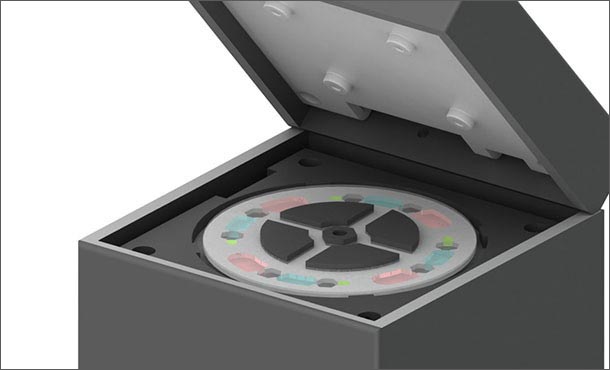
An illustration of a sample-to-answer nucleic acid testing device. IMAGE: GIHOON CHOI
Penn State engineer developing device that may be able to test for COVID-19
4/1/2020
By Sarah Small
UNIVERSITY PARK, Pa. — A point-of-care testing device to help diagnose the novel coronavirus disease (COVID-19) is under development by Weihua Guan, assistant professor of electrical engineering in Penn State’s College of Engineering.
This research is supported by Penn State seed funding that has been awarded for “research with the potential for significant and rapid impact on human health with respect to the disease (COVID-19) and the causal virus (SARS-CoV-2),” according to the call for proposals from the Huck Institutes of the Life Sciences.
Asymptomatic carriers of COVID-19 can be contagious, so early diagnosis may prove critical to controlling the spread of the disease. Guan is working to create a nucleic acid testing (NAT) method for COVID-19, which potentially could identify early asymptomatic cases by detecting genetic material instead of antigens or antibodies as traditional tests do. The advantage of a NAT method is that the virus can be detected through its genetic biomarker — RNA in the case of COVID-19 — making this method of detection one of the best for early diagnosis.
Guan previously created NAT point-of-care diagnostic devices for detecting malaria and HIV, with the help of two National Science Foundation awards.
“The technology is essentially a platform technology that can be extended toward an array of infectious diseases,” Guan said. “When we learned the genomic sequence of the SARS-CoV-2 in early February of this year, we started looking into designing the nucleic acid testing right away. My graduate students, Gihoon Choi, Zifan Tang and Tianyi Liu, have made excellent and swift progress, which has enabled us to move forward quickly.”
While Guan’s research currently is a solo endeavor, in the next phase of research, he will partner with pathogen labs to validate the technology. He is already in conversations about collaborating with several clinicians and scientists at the Penn State College of Medicine. He credits these professional connections to recent events organized by the newly established Center for Biodevices, which is led by mechanical and biomedical engineering professor Mary Frecker.
If successfully validated, this research could create a point-of-care NAT that would allow for sample-to-answer testing in a fully automated and streamlined device with a turnaround time of less than 45 minutes, according to Guan.
“I am extremely excited about the impact of this research on urgent societal needs and its potential contributions for capacity enhancement for testing COVID-19,” Guan said. “I really appreciate the timely support from the Materials Research Institute and Huck Institutes of the Life Sciences through the Coronavirus Research Seed Fund.”



